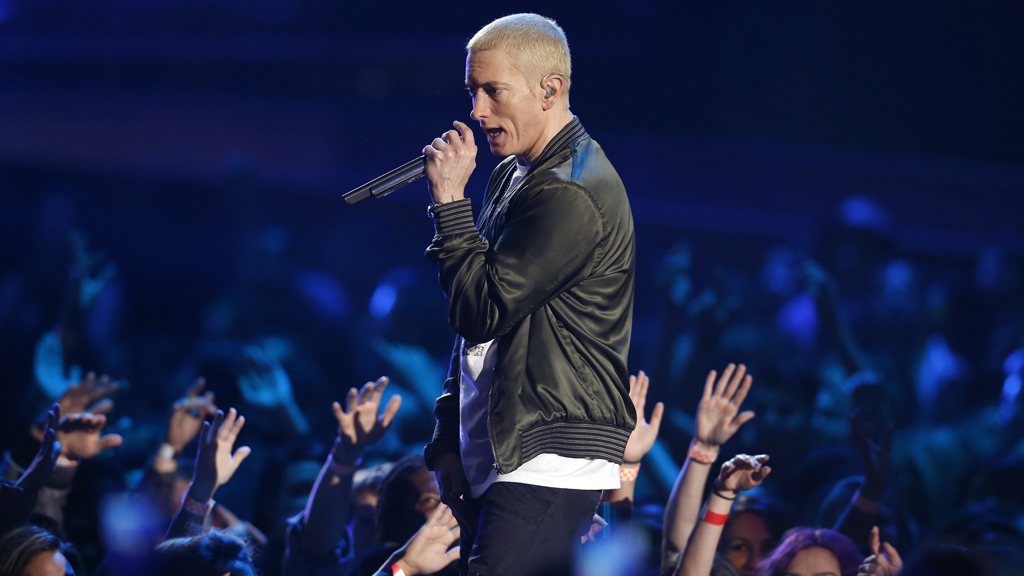What Eminem taught Britain about life in the US
This week Marshall Mathers becomes the first rapper to perform at Wembley Stadium. It marks a new milestone for an artist who has reshaped our image of America.

History did not see Eminem coming, writes Kunal Dutta.
By the end of the last century, America’s largest cultural exports like Michael Jackson and Madonna were well into their twilight years. MTV had exploded into living rooms worldwide, bringing candyfloss American pop acts like NSYNC, Limp Bizkit and Britney Spears to the masses.
Britain’s last glimpse of a white American rapper had been Robert Van Winkle, better known as Vanilla Ice. “Will it ever stop? I don’t know. Turn off the lights and I’ll glow,” Winkle rapped in the only song that most recall, Ice Ice Baby.
Stop it did, soon after. Winkle quickly lost respect among the hip hop world, and by 2011, after stints in rehab, a brief relationship with Madonna and his own DIY show, Winkle was spotted in Kent playing Captain Hook in a Christmas production of Peter Pan. His downfall was that dramatic.
Eminem, conversely, set his own terms from the off.
Controversial and contradictory
Never seeking apologies for wading in on an African American art form, his lyrics were violent, poetic and penned from the depths of his own troubled Detroit upbringing. Growing up in a dysfunctional family, his views on the generic MTV music culture were often acerbic and contradictory.
Greeted with a mixture of shock and awe, our moral compass spun and never truly settled on a consensus.
In 2003 the former home secretary David Blunkett insisted Eminem was contributing to Britain’s burgeoning gun culture.
British tabloids rumoured that George Bush had described him as “the greatest threat to America’s children since polio”. Gay rights campaigners cried outrage at lyrics seen as homophobic, but shrugged when he shared the stage with Elton John at the 2001 Grammy Awards.
‘Verbal energy’
His treatment of subjects in songs such as Stan (about a crazed suicidal stalker) and White America (which stuck two fingers up to America’s cultural conservatives) won plaudits from figures such as Zadie Smith and Seamus Heaney, who claimed his “verbal energy” had “sent a voltage around a generation”.
Even David Cameron, who has never publicly spoken on Eminem, is thought to be a fan.
What started as caricatured observations in 1999s The Slim Shady LP have morphed and grown, stopped and spluttered, as his own life has.
8 Mile, the 2002 critically acclaimed film based on his own upbringing, had an unflinching honesty at its core, while the title track Lose Yourself has become the anthem for anyone eager to overcome their own personal struggles.
England cricketer Marcus Trescothick said that singing it helped him to focus at the crease after a period of depression that ended his England batting career.
Through Eminem’s music we have learned that life, and our approach to it, is often anything but as straightforward as we project.
Growing maturity
Attitudes are also subject to change. Compare, for example, Eminem’s relationship with his mother as depicted in Cleaning Out My Closet (2002) with Headlights, 12 years later (2014).
More recent songs like Not Afraid, which finds triumph in overcoming personal struggles, and was produced after his own five-year battle with drugs, depression and writers block, is a song that Eminem admits he could never have written a decade before. “My overall look on things is a lot more mature than it used to be,” he told the New York Times recently.
His daughter Hailey, about whose fears of growing up Eminem frequently wrote about in songs, has recently graduated from school with honours. “My mother and father are (the most influential figures in my life) because they have pushed me to be the person I am,” she said recently, “and have given me all the support to achieve what I have.”
When Marshall Mathers takes the stage this Friday he will open a new chapter on a remarkable rags-to-riches story.
The irony is that by describing in brutal detail the gritty reality of the once-unspeakable working-class nightmare, Eminem becomes perhaps the most remarkable embodiment of the ultimate American dream.
Eminem's five best:
On the pressures of fame: Stan (1999)
On post 9/11 America: White America (2001)
On grasping opportunity: Lose Yourself (2002)
On raising his daughter: Mockingbird (2005)
On rehabilitation and recovery: Not Afraid (2010)
-
Latest news
-
Local Elections: Conservatives face 400 seat loss exclusive analysis reveals4m

-
Post Office Inquiry: ‘no cover-up’ insists former executive2m

-
Scotland politics: SNP leader future in doubt after opposition move3m

-
Military horses rampage through streets of London2m

-
Israel Gaza war protests sweep US campuses3m

-




